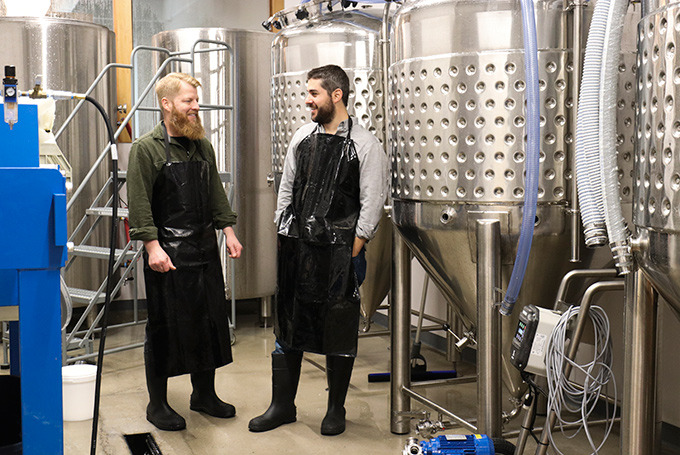Best Sake Brands In U.S.
Brooklyn Kura is distilling an American craft version of the Japanese spirit
On the heels of America's craft beer and cider booms, and in conjunction with the country's growing interest in all things Japanese, it was only a matter of time before booze enthusiasts turned a keen eye to sake. Over the last decade or so, the number of domestic sake breweries (mostly confined to the West Coast) has been slowly growing. And thanks to the unlikely duo of a former American Express executive and a biochemist, last month NYC finally landed its own inaugural distillery. Claiming a 2,500-square-foot industrial expanse in Brooklyn's Sunset Park neighborhood, cofounders Brian Polen and Brandon Doughan hope to demystify the rice spirit, making the sometimes-cryptic beverage more accessible to all.
RELATED Japan's Best Sake Comes from Its Female Distillers "
Focused on junmai-style sake made from pure rice (versus honjozo, which contains a bit of distilled alcohol), Brooklyn Kura follows Japan's ancient brewing traditions, "while using American ingredients and remaining open to experimentation," Polen explains of the company's general east-meets-west ethos. Polen goes on to say that after apprenticing at sake breweries in both Japan and Portland, Oregon, he and Doughan "were surprised and pleased with the high-quality sake that [their] amateur homebrewing experiments yielded." This success gave them confidence to launch a sake lab of their own.
The Sake-Making Process
To produce a batch of New York sake, Brooklyn Kura blends California-grown Calrose and Arkansas-grown Yamada Nishiki rice grains that have been milled down to between 50 and 70 percent of their original size. The polishing represents a hallmark of sake production that, in this case, removes roughly 40 percent of the rice's exterior, along with any impurities. (Different grades of sake are brewed from rice polished to various percentages.) The team then washes, steams and inoculates about 20 percent of that rice with koji, or mold spores. After two days of rest in a 100-degree room, the koji rice begins to produce the enzymes needed to convert starch into sugar. The grains are then blended with fresh, non-inoculated steamed rice, filtered Brooklyn water and yeast (which feeds on the sugar). A brewer then pumps the mixture into a stainless steel tank to begin the fermentation.
Founders Brandon Doughan (left) and Brian Polen (right). | Photo: Molly Tavoletti
Over the next few days, brewers add more koji, steamed rice and water, and the batch is fermented for about 30 days at around 53 degrees. Spanning about a month from start to finish, Brooklyn Kura's sake-making process is significantly faster than many breweries in Japan.
Styles of Sake
Within their spacious Brooklyn taproom and fermentation lab—equipped with a long concrete bar top and communal drinking tables—Brooklyn Kura offers a rotating selection of five house-brewed junmai sakes on tap, two of which are also packaged to go.
Currently available are a junmai ginjo nama genshu and a junmai nama genshu. For those unfamiliar with Japanese classification, that means each sake is junmai, or pure rice-style; ginjo refers to the degree to which the fermented rice is polished. Sakes made from rice polished to 60 percent or less are called ginjo, while sake simply described as just junmai signifies that the rice grain has been polished to just 70 percent or less. Meanwhile, nama represents unpasteurized sakes, and genshu references ones that are undiluted to raise their proof.
Beyond more classic sake styles, Brooklyn Kura gets playful with more unique offerings, including a cloudy orizake, a less-common style of unpasteurized, unfiltered sake; shiboritate, or unaged sake fresh from the press; and finally effervescent moromi, the live blend of actively fermenting rice, koji, yeast and water.
With uncomplicated branding, an on-hand sake sommelier and a hip aesthetic, the founders hope that Brooklyn Kura will serve as a user-friendly educational space to enlighten New Yorkers on the merits of sake.
Kat Odell, a freelance food and travel writer, is the author of Day Drinking. Follow her on Instagram at @kat_odell.
Correction: This article has been updated on 4/4/2018 to correct an error that stated Brooklyn Kura is the East Coast's first sake brewery.
Opened last month, Brooklyn Kura is the East Coast's first sake brewery.
Photo: CHAR co.
The 2,500-square-foot space is thanks to the unlikely duo of Brian Polen, a former American Express executive, and Brandon Doughan, a biochemist.
Photo: CHAR co.
Fresh cooked rice is inoculated with koji, which produces the enzymes needed to convert starch into sugar.
Photo: Molly Tavoletti
Over the next few days, Polen and Doughan blend the grains with more rice, filtered Brooklyn water and yeast, before allowing the mixture to ferment for about a month.
Photo: Molly Tavoletti
At any given time, Brooklyn Kura has a rotating selection of five house-brewed junmai sakes on tap.
Photo: CHAR co.
Many of Brooklyn Kura's sakes are also available to bring home.
Photo: CHAR co.







